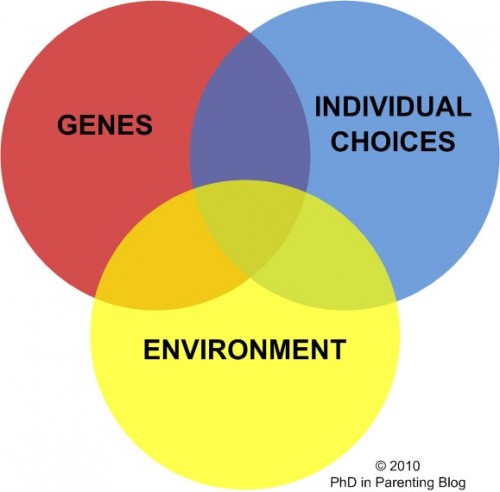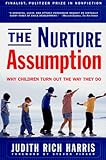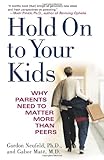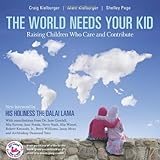Nature, Nurture and More: Books that Influenced Me
 Monday, December 20, 2010
Monday, December 20, 2010  In my last post, I outlined my perspective on the nature versus nurture discussion. I talked about the intersection between genes, environment and individual choice in determining who a person is. In that post, I promised to share the books that have influenced my thinking on this topic. In this post, I'm going to share the five books that have probably been the most influential to me as a parent beyond the baby years. I've certainly read a lot of other things too, but these are the ones I find myself coming back to as I shape and reshape my approach to parenting.
In my last post, I outlined my perspective on the nature versus nurture discussion. I talked about the intersection between genes, environment and individual choice in determining who a person is. In that post, I promised to share the books that have influenced my thinking on this topic. In this post, I'm going to share the five books that have probably been the most influential to me as a parent beyond the baby years. I've certainly read a lot of other things too, but these are the ones I find myself coming back to as I shape and reshape my approach to parenting.
The Nurture Assumption (by Judith Rich Harris)
 I picked up this book because the title and the subtitle, "Why Children Turn Out the Way They Do", caught my eye. I read a bit of the introduction and then bought it because it made me angry and I wanted to tear it apart.
I picked up this book because the title and the subtitle, "Why Children Turn Out the Way They Do", caught my eye. I read a bit of the introduction and then bought it because it made me angry and I wanted to tear it apart.
In the second paragraph of the introduction, explaining why people say that she "has a hell of a nerve", the author Judith Rich Harris writes:
This is the second edition of The Nurture Assumption, but its message remains the same. The "experts" are wrong: parental nurturing is not what determines how a child turns out. Children are not socialized by their parents. The nurture assumption is a myth and most of the research used to support it is worthless. Diplomacy has never been my strong suit.
She is right. By that I mean both that her research is sound and also that she is not at all diplomatic in her presentation of it. I found her tone to be annoying and confrontational and I got angry as I was reading it. But, I think it is an important reality check. She explains why nurture isn't the same as environment. She talks about the role that groups of peers play in shaping behaviour and who we become. She talks about the ways that culture is transmitted within a society. A lot of it made me angry both because I wanted to be able to have more influence as a parent than the research indicates that I can and also because the book signals that a lot of the things I hate about society may be more deeply ingrained in human nature than I would like to admit.
But, as angry as this book made me, it has allowed me to better understand that my influence over my children is not paramount and it has allowed me to channel my energy into the types of things that are most important rather than trying to do everything perfectly under the assumption that it is critical to their success in life. She talks about how children do bring things that they have learned at home into their peer group and if it agrees with what their peers have learned, then they will retain it. If it doesn't, then they will reject what they learned at home in favour of fitting in. If what they learned at home is irrelevant to the peer group, then they may retain it in that case too.
In the chapter where she talks about what parents can do, she says:
People sometimes ask me, "So you mean it doesn't matter how I treat my child?" They never ask, "So you mean it doesn't matter how I treat my husband? or "So you mean it doesn't matter how I treat my wife?" And yet the situation is similar. I don't expect that the way I act toward my husband today is going to determine what kind of person he will be tomorrow. I do expect, however, that it will affect how happy he is to live with me and whether we will remain good friends.
You can't argue with that logic.
Hold on to Your Kids (by Gordon Neufeld, Ph.D. and Gabor Maté, M.D.)
 This book, which has the subtitle "Why Parents Need to Matter More than Peers" is both a complement and anti-thesis to The Nurture Assumption.
This book, which has the subtitle "Why Parents Need to Matter More than Peers" is both a complement and anti-thesis to The Nurture Assumption.
A lot of people seem to have taken a different message from this book than I did. I didn't take away the message that peers are bad or that parental attachment can make peer influence irrelevant. What I did take away is that peer influence can be a destructive force if a child does not have a strong attachment to the parents to begin with and if parents do not make an effort to preserve family time.
Peers influence children in all sorts of good ways and some bad ones that are completely appropriate. However, when children look to their peers to take on the role of a parent, that is where it becomes problematic. Peers will never provide the unconditional love and support that parents can and should, yet children need that type of strong attachment. The book provides examples of families where children who do have a strong attachment to their parents will tell them things they would never tell their friends, because it is "safe". They don't have to worry about being humiliated or embarrassed for their feelings. The relationship with parents acts as a compass as children move through life. In a society where children are spending less time with their families and more time in peer-focused activities, parents may need to use specific tactics to hold on to their kids.
Like Alfie Kohn's book Unconditional Parenting (which I also recommend, but which takes a whole book to say what can probably be said in a Chapter), this book also talks about why force and manipulation (or punishment and rewards) backfire. The authors explain:
As our power to parent decreases, our preoccupation with leverage increases. Euphemisms abound: bribes are called variously rewards, incentives, and positive reinforcement; threats and punishments are rechristened warnings, natural consequences, and negative reinforcements; applying psychological force is often referred to as modifying behaviour or teaching a lesson. These euphemisms camouflage attempts to motivate the child by external pressure because his intrinsic motivation is deemed inadequate. Attachment is natural and arises from within; leverage is contrived and imposed from without. In any other realm, we would see use of leverage as manipulation. In parenting, such means of getting a child to follow our will have become embraced by many as normal and appropriate.
The authors go on further to explain the importance of the relationship between parents and their children:
No matter what problem or issue we face in parenting, our relationship with our children should be the highest priority. Children do not experience our intentions, no matter how heartfelt. They experience what we manifest in tone and behavior...Many a child for whom the parents feel unconditional love receives the message that this love is very conditional indeed....
Unconditional acceptance is the most difficult to convey exactly when it is most needed: when our children have disappointed us, violated our values, or made themselves odious to us.
When helping parents figure out how to hold on to their kids, the authors do not suggest that parents should never let their children out of their sight. However, they do stress the importance of, for example:
- Ensuring the people who do care for your children in your absence form a strong attachment with them too (e.g. child care providers, babysitters, teachers, etc.)
- Being sure to "collect" your children when you pick them up after being away, as a way to reconnect with them as you come together.
- Establishing and protecting family routines and traditions as a time that is set aside for the family to be together.
- Not rushing to set up play dates on evenings and weekends, when children have already spent much of their week in the presence of their peers instead of with their family.
- Encouraging children to interact in the context of strong adult attachments -- e.g. having a play date with another family with similar values that involves both the parents and the children, instead of just dropping the kids off.
Another book I like a lot in terms of how to create the type of attachment they are talking about is Playful Parenting by Lawrence J. Cohen, which teaches parents to use play as a tool to create attachment, to discipline, and to give their children confidence.
Ultimately, I like Hold on To Your Kids a a lot. I think it does a good job of laying out the type of relationship that I want to have with my children. However, in light of my reading of The Nurture Assumption, I do think that it may go a bit far in its hypothesis about how much influence parents can have. Parents need to have more influence than they do today in North America and a secure attachment to the parents is important, but I don't think that there is any society anywhere in the world where parents truly mean more than peers in determining who children become.
The World Needs Your Kid (by Craig Kielburger, Marc Kielburger, Shelly Page)
 In The Nurture Assumption, Judith Rich Harris says that one way parents do influence children is that they often follow in their footsteps. Doctors produce doctors, musicians produce musicians, and so on. If activists produce activists, then maybe I don't have to do much. Whether it is nature (genes) or nurture (environment, encouragement, modeling) that makes kids follow in their parents footsteps a lot of the time, I still like the idea of creating an environment that will support my children in their own endeavors to make the world a better place. No matter what they are passionate about, I want them to believe that they can make a difference.
In The Nurture Assumption, Judith Rich Harris says that one way parents do influence children is that they often follow in their footsteps. Doctors produce doctors, musicians produce musicians, and so on. If activists produce activists, then maybe I don't have to do much. Whether it is nature (genes) or nurture (environment, encouragement, modeling) that makes kids follow in their parents footsteps a lot of the time, I still like the idea of creating an environment that will support my children in their own endeavors to make the world a better place. No matter what they are passionate about, I want them to believe that they can make a difference.
This is where the Kielburgers book comes in. Most people know Craig and Marc Kielburger as the founders of Free the Children, the world's largest network of children helping children through education. Their work has inspired a lot of people over the years and they have now written a book where they share their stories and the stories of other activists about how they were raised and what things their parents did to encourage their passion.
The book includes seventeen different lessons, divided into three main sections: Compassion, Courage and Community. In each one, they tell stories (some their own, some of celebrities, and some of other regular kids who made a difference) and give tips to parents on how to encourage their children to care and to make a difference. Some of the stories are told by the authors and some of them are told in the first person by well-known activists. The book ends with 100 tips to Raise Global Citizens, summarizing the ideas shared in the book.
Will the ideas in this book make my children into people who care? Will their genes do that? Or will they turn out to be "each man/woman for himself/herself" types despite my efforts? I'm not sure. But regardless of the outcome, the ideas in this book will help me to create the type of environment I want to raise my kids in.
Reading opens the mind, fuels ideas
These books are useful to me, whether I take the ideas in these books and use them to guide my life or just use them to open my mind to the possibilities. They have taught me about the possibilities and the limitations of what I can do as a parent. Most importantly, they've reminded me to be human and seek a connection with my children and with other human beings.




















Reader Comments (9)
I love book lists. Have you read Nurture Shock? It's good. It doesn't really support one parenting style or another. Just interesting facts and statistics about raising kids in the 21st century.
Emily:
I haven't read it, but I have seen documentaries based on the book. There is some good information in it.
I clearly need to read these books. Thanks for the recommendation!
After speaking with you today, I couldn't NOT comment, even if I don't have much to offer. Plus, I have a title to defend, I need a buffer. ;)
Will the Nurture Assumption make me mad? I'm not concerned about the findings as you describe them, or a straight-forward telling of fact. I'm more concerned about the tone. You've piqued my interest in the book, but if it's tone sounds like Nanny-Nanny-Nanny, I'm not sure I can read it.
Thanks for the suggestions! I've been looking for books on parenting, so it's great to get some good suggestions.
Oddly, this statement of yours compels me to read The Nurture Assumption: "A lot of the things I hate about society may be more deeply ingrained in human nature than I would like to admit." I guess because I'm really curious about why humans are as they are. But I think that I'll save the book for springtime, when I'll perhaps be in better spirits to handle a potentially angry read. Maybe the Neufeld/Maté book first. I had a different book by Maté on my reading list — mentioned about a month ago by a commenter on my blog — but this one seems more relevant to me now.
Thank you for these reading suggestions. I've been putting together a reading list for 2011 so that I actually get to reading the things that I want to be reading. Next year I want to be sure that I always have a book in my bag for bus rides and subway rides — I've recently learned that I can actually finish reading a book in that way — gradually, by stealth — over not a lot of time.
Interesting list. The one that intrigues me the most is The World Needs Your Kid, but maybe it would be interesting to read all the books and see if my perspective changes. Before kids, I fully believed in nurture versus nature. Anecdotally I know that there has to be more to it. I now subscribe more to the idea that there is some nurture, some nature, and so many variables I think it would be too difficult to scientifically measure.
I think that parenting my children believing that I will make a difference is good for me and for them. I want to develop a warm, supportive, nurturing relationship with each. If it turns out that it makes little difference, I don't really care.
[...] Nature, Nurture and More: Books that Influenced Me from PhDinParenting has introduced to me to a couple of books to check out in the new year. [...]
I haven't read The Nurture Assumption but I've seen Judith Rich Harris's findings used to justify crap parenting - as in, it doesn't matter how we treat our children because they're going to turn out how they're going to turn out regardless of what we do because what parents do doesn't make any difference.
Not quite. In my experience of parenthood (my children are 25 and 15 now), that may hold true in conventional parenting which is founded on the belief that it's the parent's "job" to mould the child into a socially acceptable adult. It can be a highly stressful endeavour constantly pushing against a child's biological self-authority and often indeed it's doomed to failure and cries of "I did everything right and look how they turned out" (um ... no, you did everything the child management gurus told you to do and that's a different thing). Judith Harris's findings do probably come from research into conventional parenting, where unfulfilled parental expectations and rebellious children are the norm.
She's right about the happiness. Generally speaking, happy children grow into successful adults. And if I'm willing for my child to be who they are, whoever that might turn out to be, and I get out of the way of my child's development and allow her or his own perception of "success" to emerge I can focus my energy on creating circumstances that make it easier rather than more difficult for my child to be happy in whatever they are choosing to do. If that's all I can do to influence how my child turns out - and I think it probably has been - that's actually A LOT and it does make a positive difference.